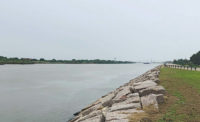"We chose Florida because of its very favorable regulatory environment," he says. "Florida, Alabama, Nevada, Arizona, parts of Texas—[they] all have very favorable regulatory environments for us."
In the case of Florida, the state health department's regulations for swimming pools contains a separate designation for "public bathing places." According to Title XXXIII, Chapter 513, of the 2013 Florida Statutes, a public bathing place for swimming includes both natural bodies of water as well as "artificial impoundments." Morgan says Crystal Lagoons is asking state and local regulators to consider their pools under this designation, which does not have the same filtration and water-treatment requirements as swimming-pool regulations.
"If they were to do a 5.5-acre swimming pool, [the cost] would be astronomical to maintain. So, from our perspective, it's incredibly cheaper," says Metro's Singleton. "You couldn't afford to build a pool at this size and maintain it."
According to Singleton, the initial U.S. deal includes four Crystal Lagoons in Florida: three in the Tampa Bay-area and one near Ft. Myers. "We have the sites selected, and we've met with various agencies on getting the permits," says Singleton. "Overall, it's probably going to take us about nine to 12 months to fully construct and fill a lagoon."
The lagoons will be located at yet-to-be-built master-planned communities. "We would normally target about 2,000 lots for a development to support an amenity like this," says Singleton. The cost of each development is estimated at between $60 million and $125 million, with the smallest development having 1,300 lots and the largest having 4,000 lots.
Singleton doesn't expect much difficulty in constructing the lagoon. "We dig ponds all the time, and [Crystal Lagoons] is providing engineering and consulting help along the way. Basically, we're digging an enormous pond and lining it, and they show us how to fill it," he says.











